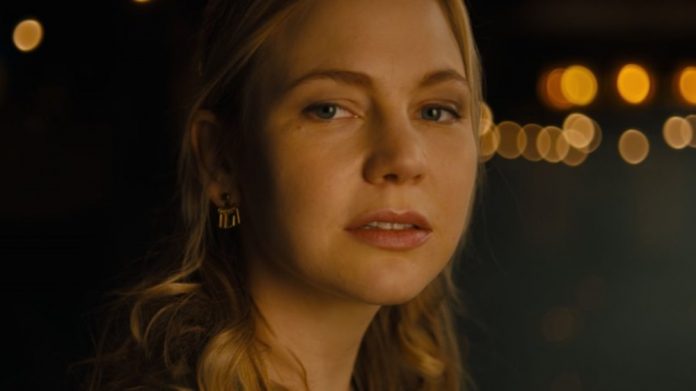Director Lindsay MacKay tackles two love stories at the same time in The Swearing Jar, an adaptation of Kate Hewlett‘s stage play that made its world premiere at last year’s Toronto International Film Festival.
Adelaide Clemens stars opposite Patrick J. Adams and Douglas Smith in the indie film, which takes a poignant, funny look at romance and the surprises that life can throw at people. Clemens plays a music teacher who puts on a concert about her relationship with her husband (Adams) as a birthday present for him, only to fall for the guitarist (Smith) she hired for the show.
Above the Line recently spoke with MacKay, who talked about working with a script based on a play that she still hasn’t seen, and how her own brain aneurysm allowed her to relate to the story. With an endearing sense of humor, she also discussed the joy of premiering at TIFF last fall, and how she was able to land such a talented cast, including Oscar-nominated actress Kathleen Turner, who plays Adams’ mother in the movie.
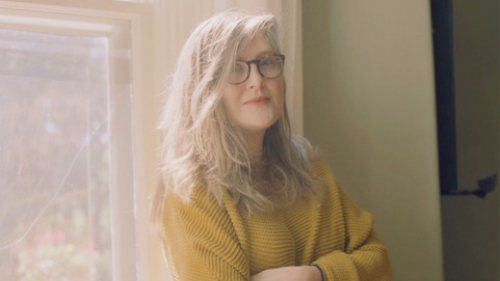
Above the Line: It’s nice to be able to revisit this film after seeing it at last year’s Toronto International Film Festival.
Lindsay MacKay: Thanks for coming to Toronto to see it!
ATL: Of course. So how did you first hear about the play?
MacKay: What was crazy is that I didn’t hear about the play until I’d read the feature. I was approached about the feature, and then I took a deep dive into Kate and read that it was a play. I wanted to read the play, but they wouldn’t let me, so I just read the screenplay. I’d love to see it. It’s being put on [in] some places, so I’d love to see what they did with it.
ATL: So you still haven’t seen or read it?
MacKay: No, I’m a horrible person.
ATL: There are a lot of films and TV shows where you can sort of tell that it’s based on a play, but I don’t think that’s the case here. Do you think it is?
MacKay: No, but it was funny because I was talking to Kate about it. There were a bunch of different directors attached to this project. It had been through a bunch of different lives. When I came on, Kate talked about how I parsed it down and made it more like the play, because she had done a lot of work to open the world up and bring in other characters so it felt less like a stageplay in her mind — [fewer] people just talking in rooms. I was like, ‘no, let’s just focus on the relationships!’ She was like, ‘in some weird way, you almost brought it back to what it was in play form.’
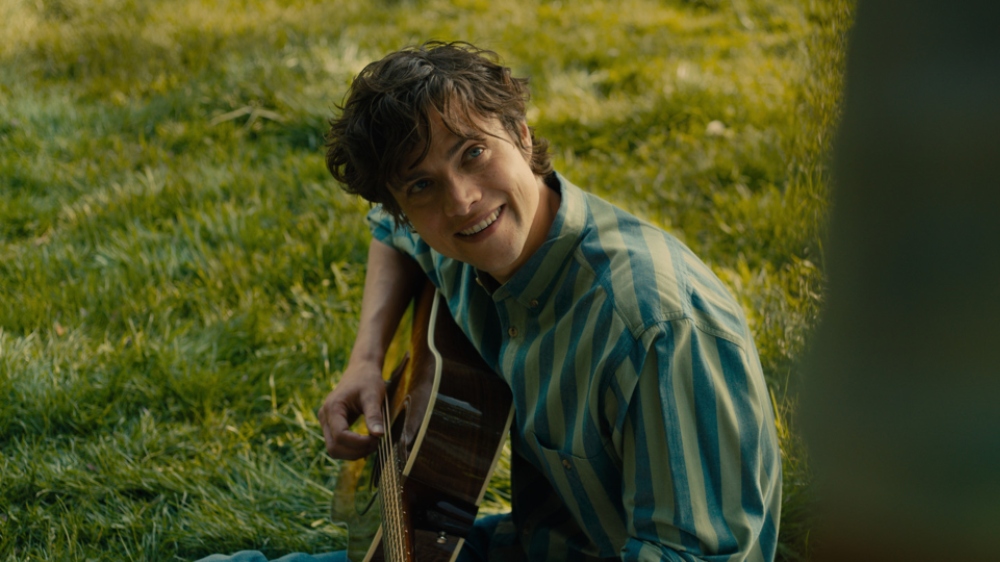
ATL: What spoke to you about the subject matter of the script?
MacKay: So much. I think Kate’s writing is really quite beautiful. I think her characters are witty and playful and intelligent. It feels very much of real life, like the way that they’re kind of cutting and mean, but [still] loving. That’s my love language. That’s how I function.
Her characters really came off the page. They were really fun to read. Also, I had a brain aneurysm. I had what [spoiler redacted] dies from in the movie. When I got the script, I was like, what?! And it’s [the] first feature that I’ve made since [my] recovery, [so] it was pretty close to home for me.
ATL: How do you feel that experience affected your job as the director?
MacKay: It gave me some important insight. [Spoiler] was questioning some things around the aneurysm, and I was like, ‘well, let me just tell ya! I’m an authority on this matter because someone‘s gone there.’ I think it helped me work with [Spoiler] around the things [that their] character is dealing with. Mine wasn’t similar to [the] character’s [aneurysm] in the movie. Mine was onset really quick, whereas [the] character kind of knows about it. So we just worked through the project and how I dealt with it and the things that [they] connected to.
And then Kathleen and I had a similar experience because she had a family [incident] that had happened that was medical and connected to the material as well. So it just felt like we all had a relation to it that was very personal, which really helped us on working through it, which was nice.
ATL: You mentioned the playful nature of things. I really love the opening scene with Carey’s singing. There’s just something so melodic and mean about it that sets the tone perfectly for a movie with this title. Is this always where you wanted to start?
MacKay: I think at one point I had something else before that, but I think that was always in Kate’s plan. I loved the idea of just — straight to camera — singing that song and swearing. It sets the tone. It’s such a brilliant song because it’s smart and funny and sweet and caring. It’s all of the things that her writing is. It’s what she does so well.
And then Adelaide does it so perfectly. She kept having trouble singing fast and then she kept kind of stumbling. There’s this little moment where she [takes] this big deep breath and continues on. She was like, ‘oh, we can’t use it,’ and I was like, ‘no, that’s it. It has to be this not-perfect thing.’ Anyways, yeah, I love it.
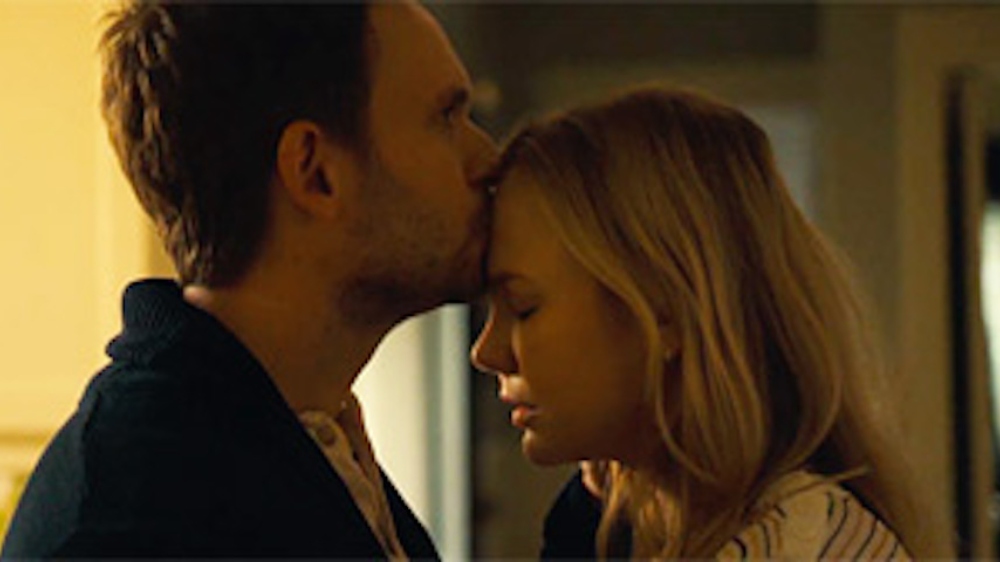
ATL: I had seen Adelaide in Rectify. That was my main experience with her. What did you know of her before working with her here?
MacKay: I had seen her in The Great Gatsby and Parade’s End. I had not seen Rectify, and so many of my friends love it. They were like, ‘you got Adelaide?’ And I was like, ‘yeah?’ They were in love with her, and now I feel like a jerk who has to go back and watch Rectify. I’m sure she’s incredible in it. Adelaide, we were lucky enough to get to audition. There were a lot of women [who] wanted this role because it’s so beautifully written and Kate’s an incredible writer. The script had been going around for a little while, but Adelaide didn’t audition. Some actresses won’t do auditions, which I understand. That’s totally fine, because you deserve the right to be offered things.
But [Adelaide] did an audition, and her audition was really exceptional. She made a few choices, which I think is always terrifying for actors — to make a choice and see if it works out — and because of those choices, I fought for her. And then I made Kate make script changes to include them because I loved them so much. She’s a powerhouse. She’s all of the things. She’s unbelievably intelligent [and] also incredibly warm, [and] so hard-working. She’s the best. I can’t say enough about her. She’s incredible.
ATL: I imagine that back home in Australia she might have a certain level of fame, but in the U.S. and Canada, she’s still flying under the radar, so I’m excited for people to get to see her work here.
MacKay: Yeah. I hope people see more of her and see this movie. There’s always a little bit of, “can they carry a movie?”, particularly in the weird independent world. Like, “of course!” She’s incredible on all fronts. She has to be playing two timelines, she does it beautifully, and then [she] can sing like an angel. The woman is crazy talented.
ATL: Patrick J. Adams has had a bit of a different career trajectory. He was on Suits, so everyone knows him, but he’s had an interesting post-Suits career.
MacKay: Yeah. He’s also incredible. They’re all incredible. I was the luckiest person. I think he had known about the project because in the different iterations, there were other directors and I’m sure, at one point, they had gone to him about it or something. When we were on the hunt, his name was brought up, so then I had a meeting with him and we talked about it, and the whole thing with him was that they were having a baby.
He was like, ‘can I fit it into this small window? Can I come up to Canada and fit it into the small window before I have a child?’ We were like, ‘yeah!’ So he came, and then on the day that he got back, he had the kid in the parking lot at the hospital. So it was very intense for him. He had heard about the script, he loved the material, and then he had to vet me. So he watched a bunch of my stuff and then was really excited and came on board.
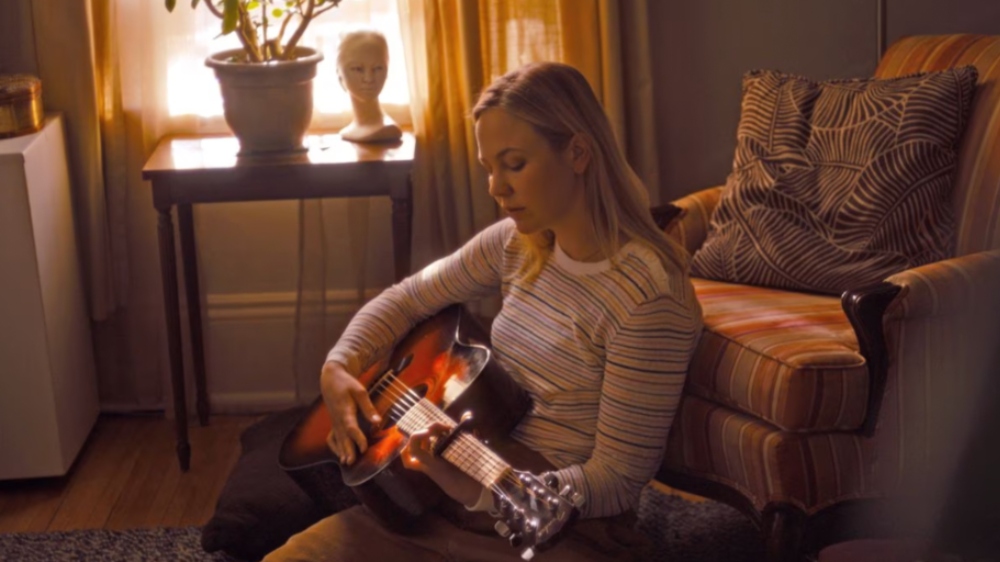
ATL: What about Douglas Smith? He’s not somebody I was very familiar with beforehand.
MacKay: I had seen him in The Alienist and Big Little Lies and I knew he was Canadian, and [that] he was up in Toronto filming a television show. With COVID, we were like, ‘who can we get [who’s] already in Canada so we don’t have to have the quarantine and all that?’ So his name popped up, and he and I met and talked about it. He was so lovely. I didn’t know, but he’s a musician. He had put out albums before, so that was a plus. ‘Okay, you’re more suited for this than I thought.’ So I got to listen to his stuff, and then we had a lot of conversations and he decided to stay in Canada for a while longer, which was really nice.
ATL: And then there’s Kathleen Turner, who is a really big get!
MacKay: It was crazy. In a different iteration of this project, she came on board with a whole other cast. We were like, ‘holy smokes, Kathleen Turner!’ And then when it went down, we were like, ‘oh no, we’re going to lose Kathleen Turner.’ And then she stayed on, which was incredible. She stayed on, no strings attached. She just really loved the project, and so when it came back together, she came to Ontario. She stayed the whole time because, with her shooting schedule, she had to be available for both timelines. She was there the whole time, which was crazy — for Kathleen Turner to hang out in Hamilton, Ontario. She really loved the material, and she was such a game player. She came on set and everyone kind of bowed down to her, myself included. But she just wants to do good work and she’s all about the authenticity of it.
She and Adelaide really connected, which was incredible for me, because they became friends through the process and because both of them were there for the whole time, it was really nice that they could have each other [like] that, and then also play angry at each other. She was really great.
I think she’s used to the way that she’s normally filmed. At first, I was really nervous to work with Kathleen Turner, so I tried to tiptoe around her and then at a certain point, she was like, ‘just tell me.’ So, then we got more serious and I started showing her certain things [about] how I was filming, and she loved it. Then everything was fair game.
ATL: Was the experience of making this film substantially different from your previous works?
MacKay: Yeah. I mean, shooting during COVID is a straight-up nightmare, particularly a love story where people have to be romantic and close. I don’t know if you’ve seen my other work or my other feature, at least, but I’m a really quiet filmmaker. In stuff that I write, there isn’t much dialogue, so it was very interesting for me to take this play, which is all — incredible — dialogue, [and] try to integrate the two — my visual senses paired with people talking to each other.
Trying to find ways to do that was really interesting for me, and so then it became more about blocking and how to make the blocking really interesting. I’m a very camera-oriented director. Not to say I’m not cast-oriented as well. I [just] really am particular about my shots, so [for me], it was [about] trying to figure out how to film things while people are talking to keep it interesting rather than just your standard wide medium, move into close-up with two overs. So that was the interesting challenge of this one for me.
ATL: You call it a love story. Do you think there are other films that tackle relationships in the same way?
MacKay: I think it is particularly unique in that form, although I’m sure someone has done it before and I just don’t know. Let me put it back to you — do you?
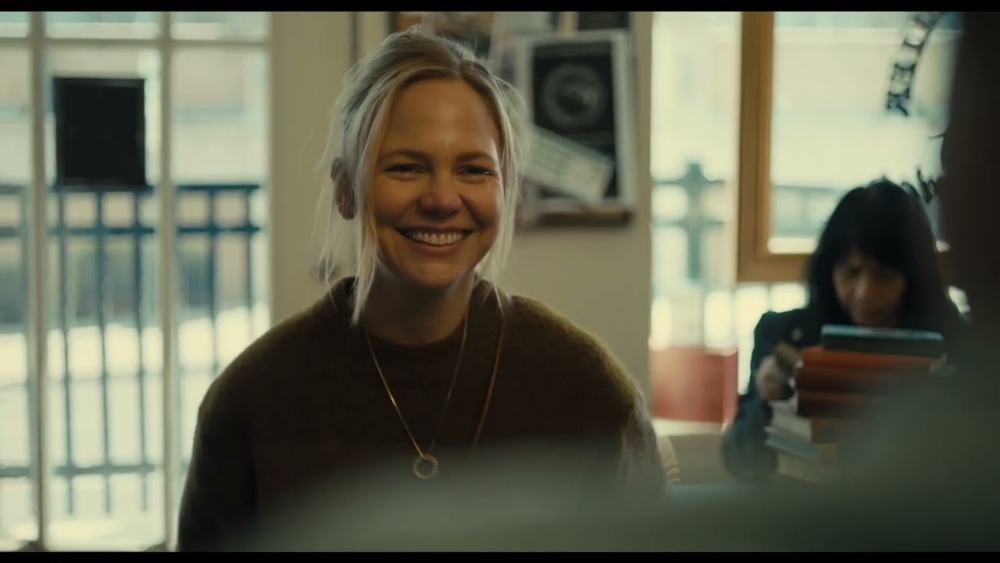
ATL: I do think it plays with audience expectations in a different kind of way. Usually, you want one relationship to work out, and I think here it has to be a little different because of what you know and what you don’t know. A lot of great movies about love feature a really tragic death because that’s sometimes how life works. Because of how this film works, you see it from different angles and different points in the process.
MacKay: When we were thinking about references, I was trying to find something that was exactly the same, but there isn’t anything that’s exactly the same because it does play with you in a way that a lot of narratives don’t. There’s trickery, which is kind of unfair, but also, it really puts you in the headspace of the main character, which is the point of it. You’re supposed to be feeling what she’s feeling and hating her just as much as she’s hating herself.
In terms of movies that do similar things, we referenced a lot of walkie-talkie-type stuff. Hilariously, a lot of people compare it to Sarah Polley‘s Take This Waltz, which I think is great [for] its time, but for me, [I] was very much like, ‘we’re not doing this movie.’ I was telling my creative people over and over that we’re not making Take This Waltz. And then it’s very similar, which is really interesting to me.
ATL: You’ve mentioned the excitement of everything being Canadian. What was it like to premiere at TIFF?
MacKay: It was lovely! I loved TIFF. They’ve been a huge supporter of my career. They are the reason why I’m a filmmaker, other than, I guess, myself doing it. They are a big supporter of mine, which has been incredible, and also of this film. It’s always really nice because during COVID, we couldn’t have a wrap party, and our cast and crew couldn’t all get together and watch the movie. We never had a screening for everybody, so it was nice to be in your hometown — not for the others, but for most of the crew — and for them to be able to see it and celebrate. Unfortunately, a lot of them were working, so we couldn’t do that. It’s a double-edged sword. It’s great that they’re working. I love Toronto and [loved] making this movie here and then getting to have friends and family be able to come to the premiere.
ATL: What’s next for you?
MacKay: Oh gosh. Can you tell me? I don’t know. A million things and nothing is kind of the way it is. I’m attached to a bunch of projects and I’m writing a bunch of my own projects, and we’ll see if any of them go. I’m really adamantly wanting to do something I’ve written again. I’m attached to two other projects that I haven’t written and I’m really excited about those, and I think they’re great projects, but it’s making me want to write again. [So], two on the burner and a few TV ideas, and we’ll see what happens.
The Swearing Jar had its world premiere at the 2022 Toronto International Film Festival.


